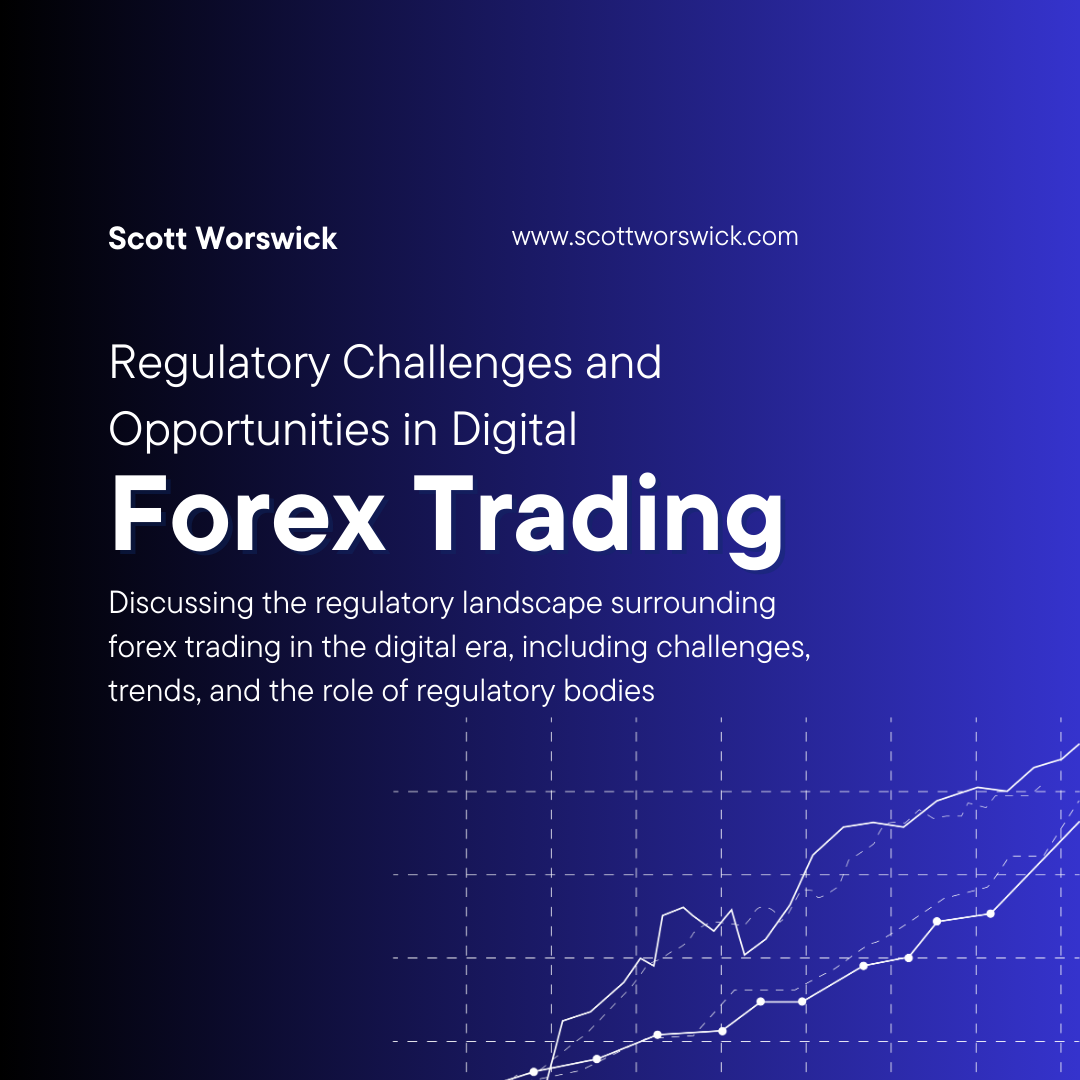In the dynamic world of global finance, digital forex trading stands as a beacon of opportunity, offering unprecedented access to the vast and liquid currency markets. However, amidst the promise of profit and the allure of technological innovation, lies a landscape fraught with regulatory challenges and complexities. This article delves deep into the intricate web of regulations that govern forex trading in the digital era, exploring the evolving dynamics, emerging trends, and pivotal role of regulatory bodies in safeguarding market integrity and investor interests.
In the fast-paced realm of digital finance, forex trading has emerged as a cornerstone of investment activity, empowering individuals and institutions alike to participate in the currency markets with unparalleled ease and efficiency. Yet, with this newfound accessibility comes a myriad of regulatory hurdles that demand careful navigation. From jurisdictional ambiguities to the rise of algorithmic trading, regulators grapple with the task of ensuring a level playing field while simultaneously fostering innovation and market growth.
As the digital revolution reshapes the financial landscape, regulatory bodies find themselves at a crossroads, tasked with adapting traditional frameworks to the complexities of the digital age. The convergence of technology and finance brings both challenges and opportunities, as regulators seek to strike a delicate balance between promoting market stability and facilitating innovation. Against this backdrop, this article embarks on a journey through the regulatory terrain of digital forex trading, shedding light on the evolving landscape and the pivotal role of regulatory bodies in shaping its future trajectory.
Table of Contents
1. Evolution of Forex Trading in the Digital Age
In the expansive tapestry of financial evolution, the dawn of the digital age has heralded a remarkable transformation in forex trading. The journey from traditional trading floors to the virtual realm has been nothing short of revolutionary, as digital platforms have democratized access to the once-exclusive world of currency markets. In this digital era, forex trading has transcended geographical boundaries, enabling investors from all corners of the globe to participate in the exhilarating world of currency exchange with unprecedented ease and convenience.

Amidst this technological renaissance, the evolution of forex trading in the digital age has been characterized by a convergence of innovation and regulation. As digital platforms proliferate and trading volumes soar, regulatory bodies face the daunting task of maintaining market integrity and ensuring investor protection. The rapid pace of technological advancement has presented both challenges and opportunities, forcing regulators to adapt traditional oversight mechanisms to the complexities of the digital landscape while simultaneously harnessing innovative tools to enhance surveillance and enforcement capabilities.
Yet, amidst the regulatory labyrinth, opportunities abound for stakeholders to collaborate and shape the future of digital forex trading. As regulatory frameworks continue to evolve in response to changing market dynamics, there exists a unique opportunity for dialogue and partnership between regulators, industry participants, and technology innovators. By fostering an environment of transparency, accountability, and innovation, stakeholders can collectively navigate the regulatory challenges of the digital era and unlock the full potential of forex trading in the digital age.
2. Regulatory Challenges in Digital Forex Trading
In the ever-evolving landscape of digital finance, regulatory challenges loom large over the realm of forex trading. The borderless nature of digital platforms has ushered in an era of unparalleled accessibility and opportunity, but it has also brought forth a myriad of complexities for regulatory bodies to navigate. From the proliferation of online trading platforms to the emergence of algorithmic trading strategies, regulators face a daunting task in ensuring the integrity and stability of the forex market in the digital age.
One of the primary regulatory challenges in digital forex trading revolves around the need to safeguard investors against fraud, manipulation, and other forms of misconduct. The anonymity and speed of transactions facilitated by online platforms create fertile ground for illicit activities, ranging from pump-and-dump schemes to insider trading. Regulators must employ sophisticated surveillance techniques and enforcement mechanisms to detect and deter such malfeasance effectively.
Moreover, the global nature of digital forex trading presents jurisdictional challenges that complicate regulatory oversight. Transactions can occur across multiple jurisdictions with varying regulatory frameworks, creating gaps in oversight and enforcement. Harmonizing regulatory standards and fostering international cooperation among regulatory bodies are essential steps towards addressing these jurisdictional challenges and promoting a level playing field for market participants.
Despite these formidable challenges, regulatory bodies have an opportunity to leverage technology to enhance their oversight capabilities and adapt to the realities of the digital era. By embracing innovations such as blockchain technology and artificial intelligence, regulators can improve transparency, traceability, and surveillance in the forex market. Moreover, collaboration with industry stakeholders and proactive regulatory initiatives can foster a culture of compliance and accountability, ultimately bolstering investor confidence and market integrity in digital forex trading.
3. Jurisdictional Issues and Cross-Border Trading
In the realm of digital forex trading, jurisdictional issues cast a shadow over the seamless flow of transactions across borders. The borderless nature of digital platforms has facilitated a surge in cross-border trading activity, presenting both opportunities and challenges for regulators. As transactions transcend geographical boundaries, regulatory bodies grapple with the complexities of enforcing regulations and safeguarding market integrity in an increasingly interconnected global marketplace.
One of the foremost challenges in cross-border forex trading is the lack of uniformity in regulatory frameworks across jurisdictions. Divergent regulations and varying levels of enforcement create a patchwork of compliance requirements that can be difficult for market participants to navigate. This fragmentation not only hampers regulatory oversight but also raises concerns about investor protection and market stability in the absence of consistent standards.
Moreover, the decentralized nature of digital forex trading exacerbates jurisdictional challenges, as transactions can occur on platforms that operate outside the purview of any single regulatory authority. This lack of centralized oversight poses significant obstacles to effective regulation and enforcement, leaving regulators with limited recourse in cases of misconduct or market abuse. Collaborative efforts among regulatory bodies are essential to address these challenges and establish mechanisms for cross-border cooperation and information sharing.
Despite the inherent complexities, jurisdictional issues in cross-border forex trading also present opportunities for regulators to strengthen international cooperation and harmonize regulatory standards. By fostering dialogue and collaboration among regulatory bodies, policymakers can work towards creating a more cohesive regulatory framework that promotes market integrity, investor confidence, and sustainable growth in the digital forex market.
4. Addressing Market Volatility and Risk Management

Navigating the tumultuous waters of market volatility is a pressing concern for regulators tasked with overseeing digital forex trading. The dynamic nature of currency markets, coupled with the lightning-fast pace of trading facilitated by digital platforms, underscores the importance of robust risk management practices. Regulatory bodies are challenged with developing and implementing measures to mitigate the adverse effects of volatility, ensuring market stability, and safeguarding investor interests in the face of fluctuating exchange rates and geopolitical uncertainties.
One of the key strategies in addressing market volatility in forex trading lies in the implementation of effective risk management mechanisms. Regulators play a crucial role in setting standards for margin requirements, leverage limits, and other risk controls to prevent excessive speculation and mitigate the potential for systemic risk. By imposing prudent risk management guidelines, regulatory bodies aim to protect investors from catastrophic losses and maintain the integrity of the forex market, particularly during periods of heightened volatility and market stress.
Furthermore, technological advancements offer promising opportunities for regulators to enhance risk management practices in digital forex trading. The advent of sophisticated analytics tools, artificial intelligence, and machine learning algorithms enables regulators to conduct real-time monitoring of market activity, identify emerging risks, and take preemptive action to mitigate potential threats to market stability. By harnessing the power of technology, regulatory bodies can bolster their risk management capabilities and adapt swiftly to the evolving dynamics of the digital forex market, ultimately fostering a safer and more resilient trading environment for participants.
5. Trends in Regulatory Approaches to Digital Forex Trading
Amidst the rapid evolution of digital forex trading, regulatory bodies are embracing innovative approaches to adapt to the complexities of the digital era. One prominent trend in regulatory approaches involves the utilization of technology-driven solutions to enhance oversight and surveillance capabilities. From algorithmic monitoring to data analytics, regulators are harnessing the power of cutting-edge technologies to detect and prevent market abuse, fraud, and misconduct in forex trading. By leveraging advanced tools and techniques, regulatory bodies aim to stay ahead of the curve and safeguard market integrity in the fast-paced world of digital finance.
Another emerging trend in regulatory approaches to digital forex trading is the emphasis on international cooperation and harmonization of standards. Recognizing the borderless nature of digital platforms and the global interconnectedness of currency markets, regulators are increasingly collaborating with their counterparts across jurisdictions to address cross-border challenges and promote consistency in regulatory frameworks. Through initiatives such as information sharing agreements and collaborative enforcement actions, regulatory bodies seek to create a more cohesive and coordinated approach to regulating digital forex trading on a global scale.
Moreover, regulatory bodies are adopting a proactive stance towards fostering innovation and market development while ensuring compliance with regulatory requirements. Rather than stifling technological advancements, regulators are seeking to strike a balance between promoting innovation and maintaining market integrity. By engaging with industry stakeholders, fostering open dialogue, and providing regulatory clarity, regulatory bodies aim to create an environment conducive to responsible innovation in digital forex trading, ultimately benefiting investors and market participants alike.
6. Role of Regulatory Bodies in Investor Protection
In the dynamic landscape of digital forex trading, regulatory bodies play a pivotal role in safeguarding investor interests and promoting market integrity. With the proliferation of online trading platforms and the increasing complexity of financial products, investors rely on regulatory oversight to ensure transparency, fairness, and protection against fraudulent schemes. Regulatory bodies are tasked with enforcing regulations that govern forex trading, including disclosure requirements, transparency standards, and measures to prevent market abuse. By upholding these standards, regulatory bodies aim to instill confidence in investors and maintain trust in the integrity of the forex market.
Central to the role of regulatory bodies in investor protection is the enforcement of robust compliance frameworks that hold market participants accountable for their actions. Regulatory bodies monitor forex trading activities to detect and deter fraudulent behavior, market manipulation, and other forms of misconduct that pose risks to investors. Through regulatory enforcement actions, such as fines, sanctions, and license revocations, regulators send a clear message that violations of investor protection regulations will not be tolerated. By holding market participants accountable for their conduct, regulatory bodies create a safer and more transparent environment for investors to participate in digital forex trading.
Furthermore, regulatory bodies play a crucial role in providing investors with access to information and resources to make informed investment decisions in forex trading. Regulatory bodies oversee the dissemination of market data, financial disclosures, and educational materials to empower investors with the knowledge and tools they need to navigate the complexities of the forex market. Additionally, regulatory bodies may offer investor protection programs, such as compensation schemes or dispute resolution mechanisms, to provide recourse for investors who have been harmed by fraudulent or negligent conduct. By promoting transparency, education, and access to redress, regulatory bodies enhance investor confidence and contribute to the overall integrity and stability of the digital forex market.
7. Balancing Innovation and Regulation
In the dynamic realm of digital forex trading, striking a delicate balance between innovation and regulation is paramount to fostering a thriving and resilient marketplace. While innovation drives the evolution of forex trading platforms and technologies, regulation plays a crucial role in safeguarding market integrity, protecting investors, and maintaining financial stability. Regulatory bodies face the challenge of adapting traditional frameworks to accommodate the rapid pace of technological advancement while ensuring that regulatory measures do not stifle innovation or impede market growth.
One approach to balancing innovation and regulation in digital forex trading involves adopting a principles-based regulatory framework. Rather than prescribing specific rules and requirements, principles-based regulation focuses on overarching principles such as fairness, transparency, and investor protection. This flexible approach allows regulatory bodies to provide guidance and set standards while allowing for innovation and adaptation to technological advancements. By emphasizing principles over rigid rules, regulators can create a regulatory environment that fosters innovation while still upholding essential regulatory objectives.
Moreover, regulatory bodies can leverage regulatory sandboxes and pilot programs to support innovation while managing regulatory risks in digital forex trading. These controlled environments allow fintech firms and startups to test new technologies and business models under the supervision of regulators. By providing a safe space for experimentation, regulatory sandboxes enable regulators to gain insights into emerging trends, assess potential risks, and develop appropriate regulatory responses. This collaborative approach facilitates innovation while ensuring that regulatory concerns are addressed, ultimately contributing to a more dynamic and resilient digital forex trading ecosystem.
8. Collaborative Engagement with Industry Stakeholders
In navigating the complex landscape of digital forex trading, regulatory bodies recognize the importance of collaborative engagement with industry stakeholders. The rapid evolution of technology and the dynamic nature of financial markets underscore the need for ongoing dialogue and cooperation between regulators, forex trading platforms, financial institutions, and technology providers. By fostering open communication and partnership, regulators can gain valuable insights into emerging trends, technological developments, and market dynamics, enabling them to develop informed and effective regulatory policies that balance innovation with investor protection.
Industry stakeholders play a crucial role in shaping the regulatory landscape of digital forex trading through their expertise, experience, and feedback. Collaborative engagement allows regulators to better understand the operational challenges, technological capabilities, and market dynamics of forex trading platforms and financial institutions. By soliciting input from industry stakeholders, regulators can develop regulations that are practical, effective, and aligned with the needs and realities of the digital forex market. This collaborative approach fosters a sense of shared responsibility and accountability among stakeholders, promoting a regulatory environment that is responsive to the evolving needs of market participants.
Furthermore, collaborative engagement with industry stakeholders enables regulators to stay abreast of emerging risks, trends, and best practices in digital forex trading. By maintaining open lines of communication and sharing information with market participants, regulators can proactively identify potential risks and develop targeted regulatory responses to address them. This proactive approach helps to enhance market stability, protect investor interests, and maintain the integrity of the digital forex market. Ultimately, collaborative engagement between regulators and industry stakeholders fosters a culture of transparency, accountability, and innovation, driving continuous improvement and resilience in the regulatory landscape of digital forex trading.
Conclusion
In conclusion, the regulatory landscape surrounding digital forex trading is undergoing a profound transformation in response to the challenges and opportunities presented by the digital era. While the borderless nature of digital platforms and the rapid pace of technological innovation have fueled the growth of forex trading, they have also introduced new complexities and risks that regulators must navigate. From jurisdictional issues to market volatility and the need for effective risk management, regulatory bodies face a myriad of challenges in ensuring the integrity and stability of the forex market in the digital age.
However, amidst these challenges lie opportunities for collaboration, innovation, and regulatory evolution. Trends such as principles-based regulation, regulatory sandboxes, and collaborative engagement with industry stakeholders offer promising avenues for regulators to adapt to the realities of digital forex trading while fostering innovation and market growth. By embracing technology, enhancing international cooperation, and engaging with market participants, regulatory bodies can develop regulatory frameworks that promote transparency, fairness, and investor protection in the digital forex market.
Moving forward, it is essential for regulatory bodies to remain vigilant, proactive, and adaptive in their approach to regulating digital forex trading. By staying abreast of emerging trends, technological advancements, and market dynamics, regulators can effectively address evolving challenges and seize opportunities to enhance market integrity and investor confidence. Through collaborative efforts with industry stakeholders and a commitment to innovation, regulatory bodies can navigate the regulatory landscape of digital forex trading with agility and foresight, ultimately contributing to a safer, more transparent, and resilient marketplace for all participants.





Pingback: Forex Trading and Cryptocurrencies: Exploring the intersection between traditional forex trading and cryptocurrencies, including the emergence of forex/crypto pairs and their implications -